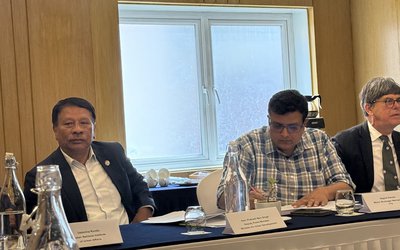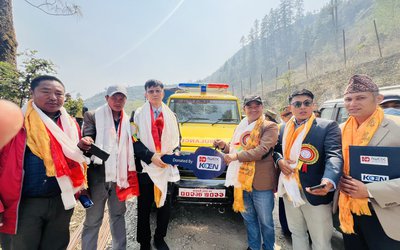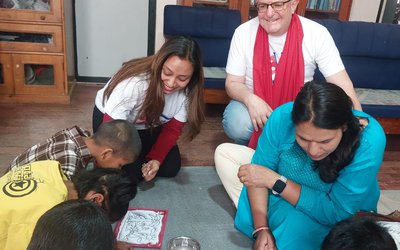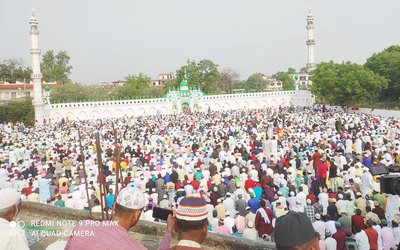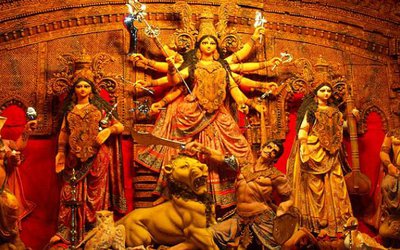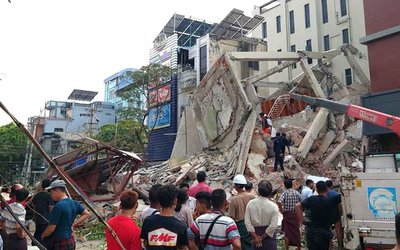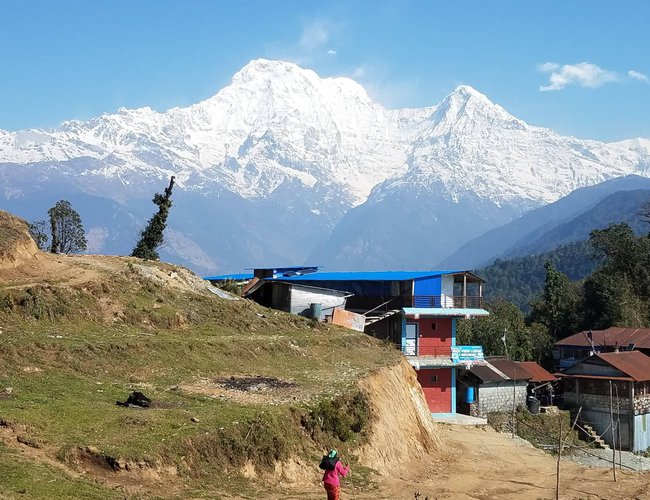
During Panchayat regime, speakers of any events were habituated to close their speeches by saying 'Jay Desh, Jay Naresh'. It might simply be a respect to the monarch, loyalty, and trust on power. From 1990s to 2020s, leaders and followers of congress and communist say 'Jay Nepal' or 'Lal Salam'. Whenever political leaders, activists or cadres meet they used to say 'Jay Nepal' or 'Lal Salam'. In the recent years, climate change has been like 'ending calls' of speeches, and this is simply recalled with no commitments for actions. Mentioning climate change in speeches has been a 'fashion' both within and outside the country. Those who should lead for urgent actions urge for actions needed. It is not heard what and where actions are necessary and what the speaker is offering his/her service to address climate change impacts in key social and economic sectors.
Scientists have repeatedly confirmed that climate change is real and atmospheric temperature is rising in an unprecedented manner due to anthropogenic emissions of greenhouse gases (GHGs). Parties to the UN Framework Convention on Climate Change (UNFCCC), Kyoto Protocoland the Paris Agreement are implementing climate actions to reduce GHGs emissions and help climate vulnerable communities adapt to and build resilience to climate change.
Nepal has attended almost all meetings right from the adoption of UNFCCC. She attended meetings of the inter-governmental committee till mid-1992 and ad-hoc committees, and sessions of the Subsidiary Bodies (SBs) and Conference of the Parties (CoPs) from 1995 onwards.
Many countries in climate negotiations send same person or a team of 'seasoned' negotiator(s) and new personalities, irrespective of the change in the government of any political parties. Same faces are repeatedly seen in climate change meetings. Few negotiators might have continued from 1990s or 2000s. For example, previous (2022-2023) and current chairs of the LDCs Group are attending climate negotiations from the last two decades. In some cases, understanding and 'verbal agreement' would betranslated into decision in writing in the following meetings. Multilaterals sessions are specified well in advance and might need more discussions to come up with a compromise solution.In Nepal, continuity does not apply for the government delegate(s). In many cases, nomination is understood as an 'incentive' rather than obligation.
Between 2008 and 2016, Nepal represented negotiating blocs such as least developed countries (LDCs), or Group of 77 (G77) and China or Asia and the Pacific Region in some agenda items of SBs and CoPs. The then government nominated timely the concerned officials to participate in meetings. After the establishment of Climate Change Section in 2008 and Climate Change Management Division (CCMD) in early 2010, three joint secretaries led the division between 2010 and 2018. Establishment of the Ministry of Forests and Environment in 2018 facilitated officials to represent the negotiating blocs in 2023 and 2024 as well but participation has been discontinued. During 2019 and April 2024, three Joint-Secretaries have led CCMD. Non-participation of an official representing negotiating blocsin major meetings have questioned Nepal's leadership in climate negotiation process.
Since April 2023, Nepal is the Chair of the Global Coordination Bureau of 45 LDCs for three years. Now, Malawi is the chair of the LDC Group for climate change. In climate negotiations, the chair of the LDC group convene meeting normally twice a year (first and last quarters), taking note of the sessions of the Subsidiary Bodies and CoPs, to develop common positions on different negotiating issues. The LDC Chair speaks and negotiates as the leader of LDCs and submit statements to the UNFCCC. In the multilateral process, effort of a single country like Nepal might not bring the desired outcomes. Several parallel efforts might be required to influence the negotiating processes. For this, frequent change of negotiator(s) and discontinued participationwould not benefit the countryrather reduce trust.
As also flagged in previous notes, Nepal did not attend the ministerial conference of the LDC ministers held in Senegal before CoP28, 45th meeting of the LDC Expert Group (LEG)in February 2024, and LDC Group strategy meeting in March 2024. Itlost the opportunity to engage LDCs to voice and negotiate on the impacts of climate change in the mountains and people.
Visit and reflections of the UN Secretary-General Mr. António Guterres in Khumbu and Annapurna base camp and statement at the Parliament of Nepal before CoP28 drew international attention to further internationalise the impacts of climate change in the mountains, people and their livelihood. Rt. Hon. Prime Minister Puspa Kamal Dahal reiterated climate change impacts in the mountains, snow melting and glaciers retreating, and called for 'compensation' for the loss from climate- and water-induced disasters.
On 2 December 2023 during CoP28 at Dubai, Nepal organised a high-level roundtable discussion on "Call of the Mountains: Who saves us from the Climate Crisis? under the chair and moderation of the Rt. Hon. Prime Minister of Nepal who urged, inter alia, to initiate a dialogue on mountain and climate change. This session was attended by the UN Secretary-General along with the Prime Minister of Andorra and climate negotiators of some mountain countries.
Two outcomes of the first global stocktake (GST1) at CoP28 on water, and mountains are consideredrecognition of our principal concerns for the time-being. Urging to enhance climate actions at home, GST1 recognised, inter alia, the "critical role of protecting, conserving and restoring water systems and water-related ecosystems in delivering climate adaptation benefits and co-benefits ..."Para 181 of the CMA.5(fifth session of the CoP serving as the Meeting of the Parties to the Paris Agreement) 'requests the Chair of the Subsidiary Body for Scientific and Technological Advice to hold an expert dialogue on mountains and climate change at its sixtieth session (June 2024)" which will be held at Bonn, UNFCCC Secretariat from 3 to 13 June 2024.
Participation and evidence-based sharing on climate change effects in the mountains, including vulnerabilities and risksat this expert dialogue may provide Nepal an opportunity to coordinate the mountain countries, explore possibilities to include mountains and climate change as an agenda of future SBSTA sessions and lead the negotiation processon mountain issues. Nepal may wish to make every effort to recognise 'mountains and climate change' a theme of the LDCs and G77 and China and lead the theme. It takes time but it is possible. Recalling the previous efforts of mountain initiative (MI) launched by Nepal during the Copenhagen Climate Change Conference in 2009, MI expert meeting at Kathmandu in 2010, sharing MI concerns throughside-events from 2010 onwards for few years during the SBs and CoPs sessions, ICIMOD's publications on climate change threats in the mountains, outcome of the international conference of mountain countries on climate change held at Kathmandu in April 2012, preparations to hold the first edition of Sagarmatha Dialogue in April 2020 on 'climate change, mountains and the future of humanity', and outcomes of the national events, continuity in participation, including of those who represent negotiating blocs,is most important and calls for special attention to reposition 'forester's image' on environment and climate change.
The press conference of the Ministry of Forests and Environment on 15 April 2024 about 'International Expert Dialogue on Mountains, People and Climate Change' to be held on 22-23 May 2024 provides hope to expedite a process to bring the mountain theme in the mainstream of climate change negotiations. This is a global agenda of mountainous countries. Being engaged in MI for nearly three years, Nepal needs to focus this theme beyond internationalising it and take leadership in preparing science-based evidenceto help negotiating blocs understand the real threats, vulnerabilities and risks from climate change to mountain people, ecosystems, natural resources, and infrastructures, and identify most pressing needs that require international priorities for urgent climate actions.
Recalling the statements at CoPs, Nepal may wish to select most prioritised thematic area(s) - water resourcesto project impacts on snow and glacier or river systems or drying up of water sources - and develop a permanent team for step-by-step negotiations to benefit her vulnerable and poor people from climate change regime. Practice of recording several issues at once and changing priorities along with the change of the delegate (s) may confuse partners in this herculean task of making climate negotiations in our favour.

Batu Uprety
Former Joint-Secretary and Chief of Climate Change Management Division, Ministry of Environment (then), and former Team Leader, National Adaptation Plan (NAP) formulation process. E-mail: upretybk@gmail.com
- Sagarmatha Sambad: Likely Bearing the Fruits
- Mar 27, 2025
- Decadal Experience In Preparing The NDC
- Mar 03, 2025
- Over Five Decades Of Concern On Air Pollution
- Jan 16, 2025
- Damaging The Functional EIA Track
- Dec 22, 2024
- Baku CoP29 Outcomes And Nepal's Initiatives
- Nov 26, 2024



